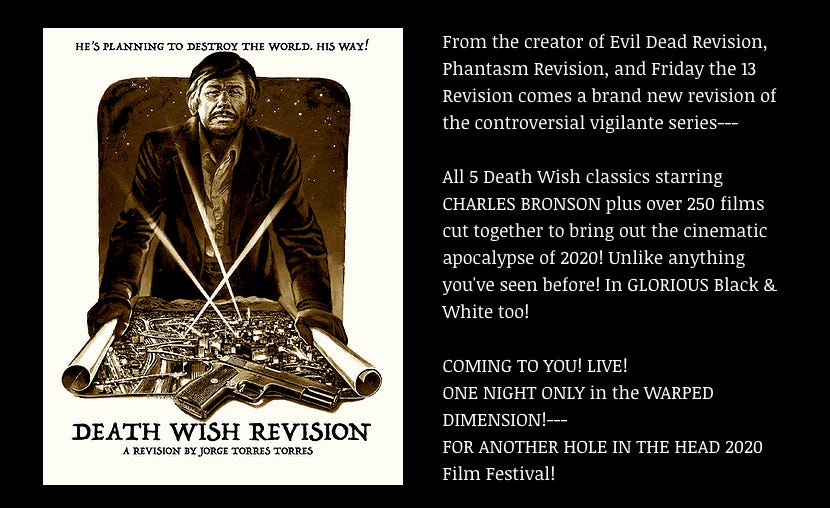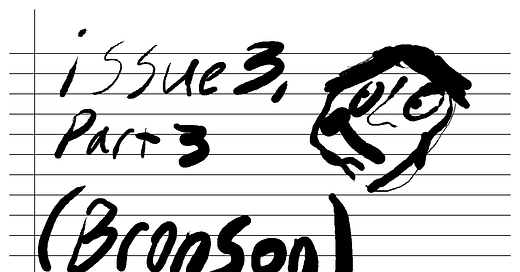Of Those Who is an independent newsletter of film criticism and moviegoing coverage. Please visit the About page for a primer on what this is, share/forward around if you like what you read, and if this has arrived in your inbox by mistake, do click unsubscribe at the bottom of this letter.
Support Your Cinema(s) :)
Of all the revenge-fantasy films out in the American action genre (and there’s plenty), the Death Wish series has inspired much derision, excitement, and fright from all five of its films, no matter how campy and silly they progressively get. Charles Bronson’s Paul Kersey is a messenger of both the concept and embodied figure of death itself, going from well-off and sickened bleeding-heart liberal to grief-stricken and sick serial killer, moving from guns to bombs to bazookas to poison as if he has an “aw shucks” grin the whole time.
It’s amazing how the first film works as a somewhat serious tale of a man gone mad, and how the franchise quickly moves from there into the gross celebration of killing, quite steeply. These movies aren’t Network level self-fulfilling prophecy types, but neither are they “just” actioners.
There are multitudes. Multitudes.
Filmmaker Jorge Torres-Torres (Shadow Zombie, Fat Tuesday) constantly surprises with his various revisions (or fan-edits) of different film series, from Friday the 13th to Evil Dead to Star Wars - where his story is exclusively from the Droids perspective - adding and pulling out satirical and dramatic angles that otherwise would’ve gone on unlabeled. Death Wish Revision continues this trend but in a much grander capacity, by using media from over 250 films and songs, to not just express his vision of Kersey’s journey, but to end the year that was 2020 by cathartic means.

The video essay - and indeed, this is more essay than supercut - begins where Death Wish starts: on the beach. A moment of cute romance between two adults, at the end of the world. The presentation is entirely (save for a few special scenes) bathed in ugly grey tones, stripped of any kind colors, from beginning to conclusion. There are few and far between points of respite for us and Kersey, though the escalation of killing kicks in at roughly fifteen to twenty minutes in; before then, we (us and Kersey) all have moments of consideration, reconsideration, and time to breathe and just stop. Of course, the audience can’t. And with that, neither can Charles Bronson.
Death Wish Revision doesn’t cover this psychological territory ala Funny Games or ala anything else, but there is a component that has infinite staying power: Death Wish as a virus. Jason Goes to Hell gave us a variation of this idea, but Jorge Torres-Torres one-ups with the frightening thought of the very series being an illness, one that can infect as much as it entertains, or rather infects through “entertaining.” It’s never overtly stated, but with a few glances and walk-aways and voice-overs, it’s announced how Kersey/Bronson isn’t simply true damage incarnate, but that his actions and his legend are feared as things that can possess us too.
He is death. There is no light. Give in.
That is a half dramatic and half satirical notion of course, especially as Revision continues on, we see Kersey/Bronson’s physique go from in-shape older gentleman to much older and obviously slower and tired man. He’s what we fear? Yes, and why not? Torres at times plays pretty loose with whether he’s being funny or not. One such sequence blends together Kersey/Bronson at dinner with colleagues and the iconic When Harry Met Sally diner scene. As everyone eating watches news of a vigilante on the loose in the city, a woman coos and orgasms to the breaking story, while Kersey/Bronson smirks and eats.
Laughs are had in many parts yes, like when police are beating up Kersey/Bronson, RoboCop appears behind glass, walking down a hallway. He never appears again, but the image from that scene in Friedkin’s Cruising - the interrogation/intimidation scene - cropped up in the mind, and embedded long enough to create not just laughs, but genuine tension.
Amazing editing.
There’s horror, there’s comedy, there’s drama, and there’s craft to be seen in Death Wish Revision. You’ll appreciate and despise the series all over again, while absorbing some wonderful and sometimes crass humor and criticism. This unbridled orgy of violence is finally dealt with at the end of 2020 in the only way we can think of; explosions. How sad, how disgusting, but…
… why not?
Stay tuned! :)





